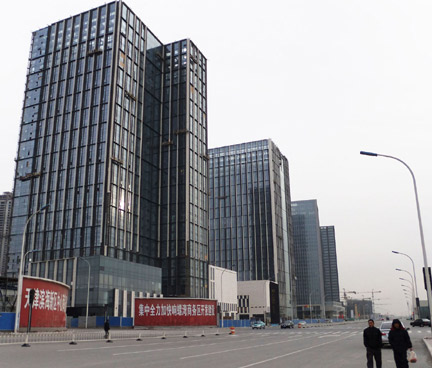|
|
 Upon approval, the Dongjiang Free Trade Port Zone in Tianjin's Binhai New Area will be transformed into a tax-free island offering rebates to tourists. Other coastal port cities have also prioritized a tax-rebate plan to fuel tourism and their local economies. [Mai Tian / for China Daily] Upon approval, the Dongjiang Free Trade Port Zone in Tianjin's Binhai New Area will be transformed into a tax-free island offering rebates to tourists. Other coastal port cities have also prioritized a tax-rebate plan to fuel tourism and their local economies. [Mai Tian / for China Daily] |
BEIJING - Tianjin is joining a number of coastal cities, including Shanghai and Shenzhen, that have announced their plans to set up the country's next tax-rebate zone. That's after the tropical Hainan Island was given the green light to provide tax-refunds on products in April.
In the city's three-year plan, the Dongjiang Free Trade Port Zone of Tianjin will be transformed into a tax-free island offering tax refunds to tourists, once its application has been approved, according to Huang Xingguo, mayor of Tianjin, who was quoted in the Securities Daily on Saturday.
The zone, located at Binhai New Area, a government-designated economic zone 45 minutes' drive from downtown Tianjin, is the country's largest bonded port by size.
Situated adjacent to Beijing and Tianjin, where consumption is robust, the proposed tax-free zone would be easily distinguishable from non-tax-free areas. It also has existing advantages in logistics and other facilities, Yu Rumin, chairman of the board of Tianjin Port (Group) Co Ltd, told the newspaper.
Tax-free luxury goods available to increasingly affluent Chinese within the country have created many opportunities for tourism and retail services.
China is poised to become the world's largest market for luxury goods by 2020, according to a report from the brokerage and investment group CLSA Asia-Pacific Markets in February. The country will account for 44 percent of global sales over the next decade, up from 15 percent at present, the report said.
Experts believe that tax rebate policies in more designated sites will stimulate domestic demand.
Eyeing the profits from tax-free retail businesses, the country's financial hub Shanghai was reported in May to be working on plans to make its Pudong New Area District a tax-free zone.
Coastal port cities such as Zhoushan in Zhejiang province in the east of the country, and Zhuhai and Shenzhen in Guangdong province in the south, have also prioritized a tax-rebate plan to fuel tourism and their local economies.
Hainan Island, the first province to implement a program of tax rebates, had seen about 40,000 tourists granted rebates on around 150,000 products by May 20.
The island has set a rebate cap on goods priced at no more than 5,000 yuan ($772) for each person for each visit from designated shops.
The policies apply to tourists from both home and abroad who fly on to other destinations in China from the island.
Each traveler can claim a rebate twice a year, while residents of the island can claim once a year.
The program, based on similar programs at Jeju Island in South Korea, and Okinawa, Japan, echoed the State Council's goal to build Hainan into a top international tourism destination by 2020. |

